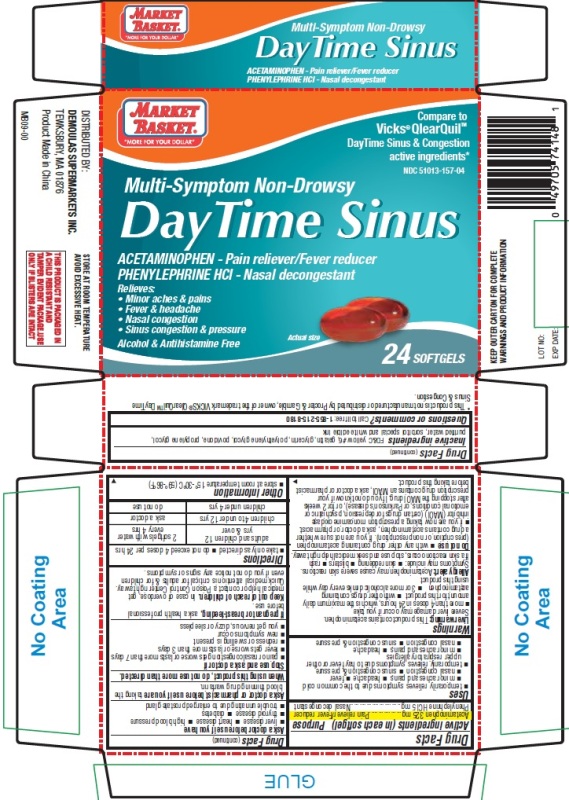Daytime Sinus | Acetaminophen, Phenylephrine Hydrochloride Capsule while Breastfeeding

What is Daytime Sinus | Acetaminophen, Phenylephrine Hydrochloride Capsule used for?
Brief: Pain reliever/Fever reducer Nasal decongestant
Can I continue breastfeeding if I am using Daytime Sinus | Acetaminophen, Phenylephrine Hydrochloride Capsule? How long does it stays in breast milk?

Daytime Sinus | Acetaminophen, Phenylephrine Hydrochloride Capsule Breastfeeding Analsys
Acetaminophen while Breastfeeding
SafeCAS Number: 103-90-2
Excreted in very low amount into breast milk. Infant intake may be lower than 4% of usual pediatric dose. The American Academy of Pediatrics rates it as compatible with Breastfeeding.
Phenylephrine hydrochloride while Breastfeeding
Low RiskCAS Number: 59-42-7
Used on topical decongestant solutions for nose drops at low concentration. 10% midriatic eye drops are available. Because low concentration is used on nose and ophtalmic drops a significant excretion into breast milk is unlikely. Low oral biodisponibility minimizes any risk of harmful effect in the infant. Authorized for nasal or ophtalmic use on children aged younger than 1 year. Although on latest update relevant data on breastfeeding was not found it is considered to be safe when minimal dose is used. Avoid excessive or long term use. A related drug Pseudoephedrine can inhibit milk production. It would be advisable to press on the lachrimal sac to minimize absorption.
Daytime Sinus | Acetaminophen, Phenylephrine Hydrochloride Capsule Breastfeeding Analsys - 2
Acetaminophen while Breastfeeding
CAS Number: 103-90-2
Acetaminophen is a good choice for analgesia, and fever reduction in nursing mothers. Amounts in milk are much less than doses usually given to infants. Adverse effects in breastfed infants appear to be rare.
Phenylephrine hydrochloride while Breastfeeding
CAS Number: 59-42-7
The oral bioavailability of phenylephrine is only about 40%,[1] so the drug is unlikely to reach the infant in large amounts. However, intravenous or oral administration of phenylephrine might decrease milk production. Because no information is available on the use of oral phenylephrine during breastfeeding, an alternate drug may be preferred, especially while nursing a newborn or preterm infant.Phenylephrine nasal spray or ophthalmic drops are less likely to decrease lactation. To substantially diminish the effect of the drug after using eye drops, place pressure over the tear duct by the corner of the eye for 1 minute or more, then remove the excess solution with an absorbent tissue.
What should I do if I am breastfeeding mother and I am already exposed to Daytime Sinus | Acetaminophen, Phenylephrine Hydrochloride Capsule?
During whole lactation period you shall first discuss with your doctor and then together you shall decide whether you shall take that drug or not however if you have already taken Daytime Sinus | Acetaminophen, Phenylephrine Hydrochloride Capsule then you shall inform your doctor, But you should not be worried too much as Daytime Sinus | Acetaminophen, Phenylephrine Hydrochloride Capsule comes in category of low risk drug.
My doctor has prescribed me Daytime Sinus | Acetaminophen, Phenylephrine Hydrochloride Capsule, what should I do?
Though Daytime Sinus | Acetaminophen, Phenylephrine Hydrochloride Capsule dose not comes in category of safe drugs rather it comes in category of low risk but if your doctor is aware that you are breastfeeding your baby and has still recommended it then its advantages must be outweighing the risks.
If I am using Daytime Sinus | Acetaminophen, Phenylephrine Hydrochloride Capsule, will my baby need extra monitoring?
Not much
Who can I talk to if I have questions about usage of Daytime Sinus | Acetaminophen, Phenylephrine Hydrochloride Capsule in breastfeeding?
US
National Womens Health and Breastfeeding Helpline: 800-994-9662 (TDD 888-220-5446) 9 a.m. and 6 p.m. ET, Monday through Friday
UK
National Breastfeeding Helpline: 0300-100-0212 9.30am to 9.30pm, daily
Association of Breastfeeding Mothers: 0300-330-5453
La Leche League: 0345-120-2918
The Breastfeeding Network supporter line in Bengali and Sylheti: 0300-456-2421
National Childbirth Trust (NCT): 0300-330-0700
Australia
National Breastfeeding Helpline: 1800-686-268 24 hours a day, 7 days a week
Canada
Telehealth Ontario for breastfeeding: 1-866-797-0000 24 hours a day, 7 days a week
